How the ‘war on terror’ paved the way for student deportations in the US
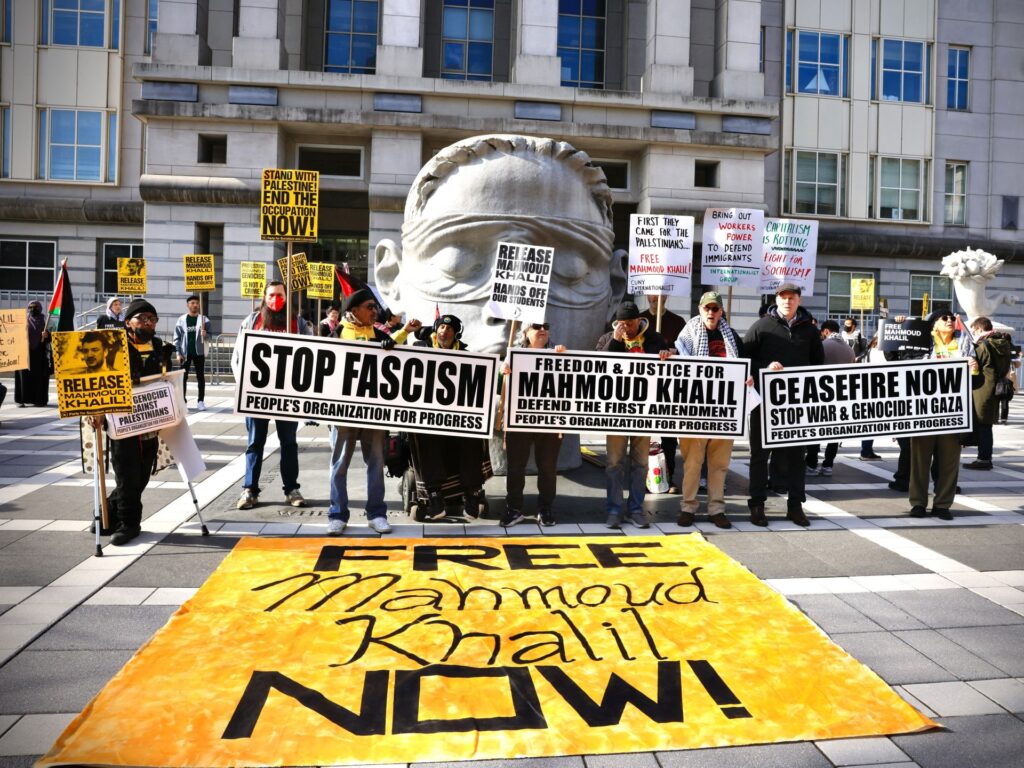
When Asad Dandia received a message from a young man named Shamiur Rahman in March 2012, he had no reason to suspect that he was under the watchful eye of state surveillance. Rahman simply seemed interested in deepening his relationship with Islam and getting involved in charity work. As a Muslim community organiser in New York City, Dandia was happy to help. The young man quickly became a regular at meetings, social events and efforts to help low-income members of the community. Rahman even spent a night in Dandia’s family home. But nearly seven months later, Rahman made a confession over social media: He was an undercover informant for the New York City Police Department (NYPD). Dandia ultimately joined a class-action lawsuit, alleging the city of New York singled out Muslim communities for surveillance as part of the wider “war on terror” in the United States. Four years later, the city settled, agreeing to protections against undue investigations into political and religious activities. Advertisement But Dandia sees an echo of his experience in the present-day arrests of pro-Palestinian student protesters from abroad. He is among the activists and experts who have observed an escalation of the patterns and practices that became core features of the “war on terror” — from unwarranted surveillance to the broad use of executive power. “What I endured was very similar to what we’re seeing students endure today,” Dandia said. He noted that a lawyer who represented him is now working on the case of Mahmoud Khalil, a Columbia University student and permanent resident facing deportation for his pro-Palestine activism. The administration of President Donald Trump has accused Khalil of supporting terrorism, though it has yet to charge him with a crime or release evidence to substantiate the claim. Dandia said that the belief that Muslim, Arab and immigrant communities are inherently suspect is the common thread between their experiences. “Even if what Trump is attempting now is unprecedented, it’s drawing from longstanding traditions and policies.” From neighbours to enemies Scholars and analysts say that one of the throughlines is the pairing of harsher immigration enforcement with rhetoric focused on national security. The “war on terror” largely began after the attacks on September 11, 2001, one of which targeted New York City. In the days that followed, the administration of former President George W Bush began detaining scores of immigrants — nearly all of them from Muslim, Arab and South Asian communities — over alleged ties to terrorism. Advertisement The American Immigration Council, a Washington-based nonprofit, estimates that 1,200 people were arrested in the initial sweep. Many were ultimately deported. But the immigration raids did not result in a single conviction on terrorism-related charges. A 2004 report by the American Civil Liberties Union (ACLU) noted that the government nevertheless advertised the deportations as “linked to the September 11 investigation”. “Almost immediately after 9/11, Muslim communities were treated not as fellow New Yorkers who were living through the trauma of an attack on their city, but as potential accessories, witnesses, or perpetrators of a follow-on attack,” said Spencer Ackerman, a reporter who covered the war on terror and is the author of the book Reign of Terror. The ACLU report says that some of those detained were held in solitary confinement and only allowed to leave their cells with shackles on their hands and legs. Some were kept in detention long after the government cleared them of any wrongdoing. Fear in ‘the homeland’ Nikhil Singh, a history professor at New York University, believes that period of heightened fear caused the US to look inward for enemies, among its own communities. “The argument that the US was fighting these non-state groups who didn’t have borders started to imply that the fight against those enemies could take place anywhere, including in what the Bush administration started to call ‘the homeland’,” said Singh. He pointed out that those post-September 11 detentions exercised a broad view of executive power, in order to justify a lack of due process for alleged terror suspects. Advertisement “A lot of what’s happening now can be traced back to this moment, where this argument became normalised that the executive is responsible for keeping the country safe and, for that reason, needs to be able to suspend basic rights and ignore constitutional restraints.” Art Eisenberg, executive counsel at the New York branch of the ACLU, explained that the history of targeting immigrant communities for national security concerns stretches beyond the “war on terror”. “The origins of policing and surveillance and undercover work targeting immigrant groups goes all the way back to the beginning of the 20th century. The New York City police intelligence bureau used to be called the Red Squad, but earlier it had been called ‘the Italian squad’,” said Eisenberg. Over time, those operations morphed to target new sources of potential dissent: communists, civil rights activists and the Black Panthers, among others. But he added that the “war on terror” marked an escalation of that targeting. And those types of actions can have lasting effects on communities. The ACLU notes that, in the years after the September 11 attacks, more than one-third of Pakistanis in a Brooklyn neighbourhood known as “Little Pakistan” were deported or chose to leave the area. Later, in 2012, when it was revealed that authorities had been spying on Dandia’s organisation, donations started to dry up, and the mosque where they held meetings told them to meet outside instead. No one had been charged with a crime. But the chilling effect of the surveillance caused the organisation to eventually close its doors, according to Dandia. Advertisement “People always ask this question: If you’re not doing anything wrong, why should you worry?” said Dandia. “But it’s the government that is deciding what is right and wrong.” Escalating attacks Under the Trump administration, critics say vague allegations of terrorism continue to be seized upon as a pretext to silence dissent. In a statement about Khalil’s arrest, the Department of Homeland Security claimed
Judge blocks Trump effort to shutter Consumer Financial Protection Bureau
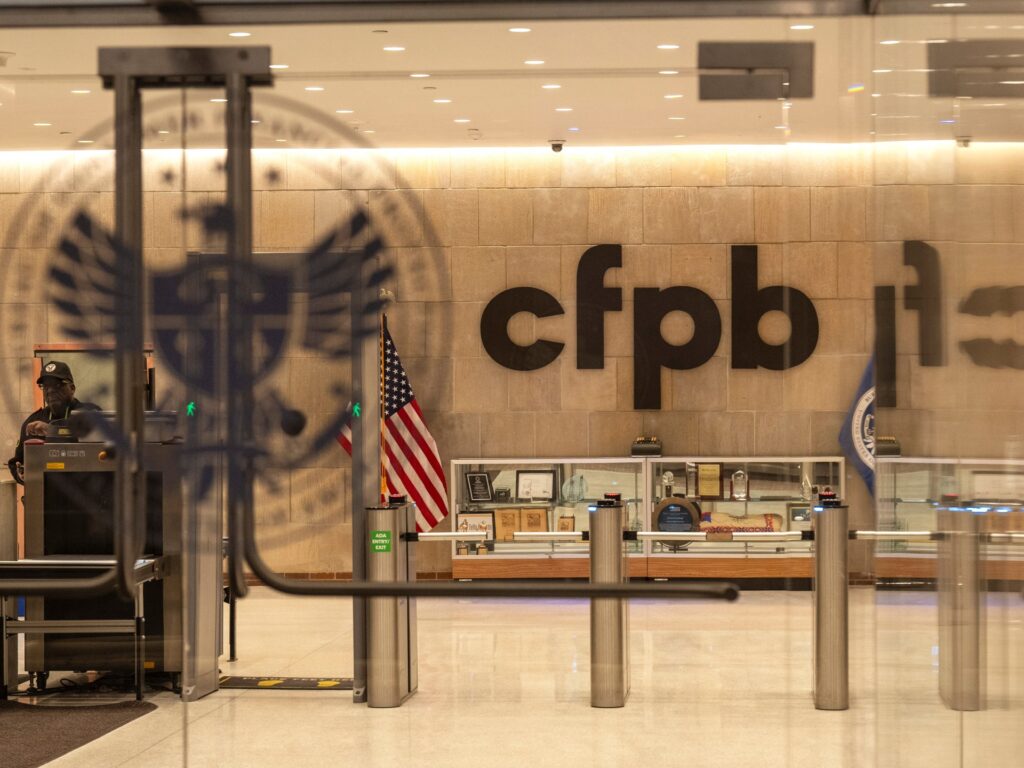
A federal judge has ordered a halt to attempts under President Donald Trump to dismantle the Consumer Financial Protection Bureau (CFPB), an independent government agency charged with investigating and preventing financial malpractice. On Friday, US District Judge Amy Berman Jackson granted a request from employees, advocates and union representatives to issue a preliminary injunction, preventing the bureau from being shuttered while court proceedings continue. “The Court cannot look away or the CFPB will be dissolved and dismantled completely in approximately thirty days, well before this lawsuit has come to its conclusion,” the judge wrote in her order. She agreed with the plaintiffs that there was a risk of immediate, irreparable harm, given the speed with which the Trump administration’s efforts have unfolded. “If the defendants are not enjoined, they will eliminate the agency before the Court has the opportunity to decide whether the law permits them to do it,” Berman Jackson wrote. Advertisement The ruling was the latest in the myriad court decisions facing the Trump administration’s campaign to streamline the federal government, often through large-scale staffing cuts and the elimination of entire agencies and departments. Earlier in the day, Secretary of State Marco Rubio even announced he had informed Congress of plans to absorb the US Agency for International Development (USAID) into the State Department, putting its independent functions under executive control. But critics have questioned whether such manoeuvres are legal. They argue that agencies like USAID and the CFPB were created as independent organisations under Congress and that the president has overstepped his constitutional bounds by overriding those congressional decisions. The CFPB, in particular, has long been a target of conservative ire. Established in 2011, the bureau was founded in response to the financial crisis of 2007 that was spurred on by predatory lending practices. As an independent agency, the CFPB served as a watchdog, collecting research, monitoring financial markets and fielding complaints from ordinary consumers facing illegal or deceptive actions from their banks or financial service providers. As of December 2024, the bureau had claimed credit for returning $21bn to consumers through debt relief, reductions or monetary compensation stemming from its enforcement activities. But many Republicans and financial industry leaders have chafed at its enforcement and regulatory activities, accusing the bureau of hampering businesses. Advertisement On January 31, shortly after the start of his second term as president, Trump moved to fire the bureau’s director, Rohit Chopra, and replace him with an ally. By February 8, the bureau had been ordered to cease all investigations, including pending ones, and stop any enforcement activity fundamentally halting its functions. The next day, its headquarters was closed. The bureau also started to see the same widespread layoffs facing other federal agencies. Judge Berman Jackson opened her 112-page decision with quotes from some of the CFPB’s critics within the Trump administration. “The CFPB has been a woke and weaponised agency against disfavoured industries and individuals for a long time. This must end,” said Russell Vought, the director of the Office of Management and Budget under Trump. Another critic quoted in Berman Jackson’s order was Trump adviser and billionaire businessman Elon Musk, who called to “delete” the bureau. “CFPB RIP,” he wrote succinctly on February 7, as his Department of Government Efficiency (DOGE) led the dismantling of the organisation. Musk has been accused of having a conflict of interest with the CFPB, as he expands the financial services available on his social media platform X. Judge Berman Jackson emphasised she did not take her decision lightly in the opening lines of her ruling. “The motion for preliminary injunction to be decided boils down to one question: should the Court take action to preserve the Consumer Financial Protection Bureau now before the case concerning its fate has been resolved?” Berman Jackson wrote. “That is an extraordinary step.” Advertisement Still, she indicated that the injunction was necessary: “The Court’s oversight is the only thing holding the defendants back.” Among the plaintiffs were the National Treasury Employees Union and the National Association for the Advancement of Colored People (NAACP), a prominent civil rights organisation. But there was also an individual named in the complaint: Reverend Eva Steege, an 83-year-old Lutheran pastor who sought the CFPB’s help for student loans she incurred while at seminary. While investigating Steege’s case, the CFBP found she not only qualified for loan forgiveness but also for $15,000 returned in overpayments. Steege is in hospice care at the time, according to the complaint. “It was her hope to resolve the debt and spare her family that burden after she died,” Judge Berman Jackson wrote in her ruling. But the sudden shutdown of the CFPB’s services left Steege in a lurch, without a resolution to her case or a refund of her overpayment. “Steege’s fear of leaving her surviving family members saddled with her student loan debt came to pass on March 15, when she died,” the judge explained. Berman Jackson said the case raised questions about the separation of powers under the US Constitution and whether the president had encroached upon “legislative authority”. “The evidence reveals that: the defendants were in fact engaged in a concerted, expedited effort to shut the agency down entirely when the motion for injunctive relief was filed,” she wrote. “While the President is free to propose legislation to Congress to accomplish this aim, the defendants are not free to eliminate an agency created by statute on their own, and certainly not before the Court has had an opportunity to rule on the merits of the plaintiffs’ challenge.” Advertisement She also highlighted what she called a “disingenuous” arguments from the Trump administration’s lawyers. “The Court is left with little confidence that the defense can be trusted to tell the truth about anything,” the judge wrote. Adblock test (Why?)
Myanmar-Thailand earthquake death toll passes 700
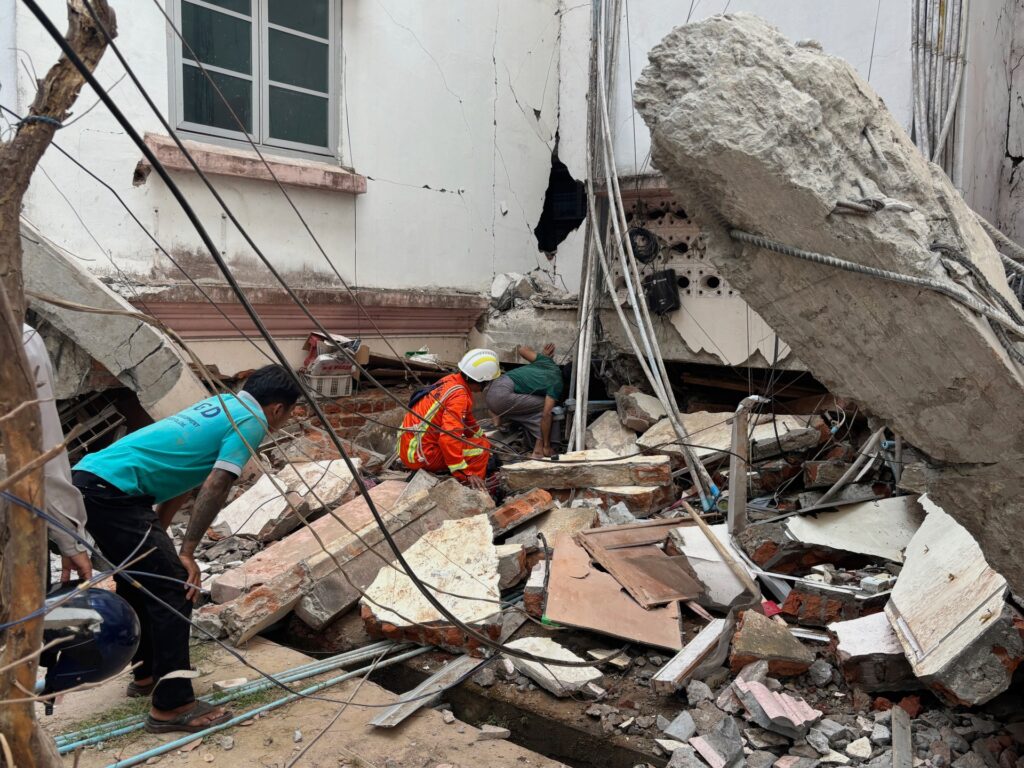
BREAKINGBREAKING, Myanmar’s military rulers say at least 694 people killed following earthquake that also killed 10 people in Thailand’s capital, Bangkok. The death toll from a huge earthquake that hit Myanmar and Thailand has passed 700, as rescuers dug through the rubble of collapsed buildings in a desperate search for survivors. At least 694 people were killed and nearly 1,700 injured in Myanmar’s Mandalay region – the country’s second-largest city and close to the epicentre of the quake – the country’s military government said in a statement on Saturday. In the Thai capital Bangkok – located 1,000km (620 miles) from the epicentre in Myanmar – about 10 more deaths have been confirmed. “Infrastructure such as roads, bridges, and buildings were affected, leading to casualties and injuries among civilians. Search and rescue operations are currently being carried out in the affected areas,” Myanmar’s military said in the statement, which raised the death toll sharply from a previously reported 144 deaths. The shallow 7.7-magnitude quake struck northwest of the city of Sagaing in central Myanmar in the early afternoon on Friday, followed minutes later by a 6.7-magnitude aftershock. Advertisement The quake destroyed buildings, downed bridges, and buckled roads across swathes of Myanmar, and due to patchy communications in remote areas many believe the true scale of the disaster has yet to emerge. Rescuers in Bangkok laboured through the night on Friday searching for workers trapped when a 30-storey skyscraper under construction collapsed, reduced in seconds to a pile of rubble and twisted metal by the force of the shaking. Bangkok Governor Chadchart Sittipunt said that around 10 people had been confirmed killed across the city, most in the skyscraper collapse. But up to 100 workers were still unaccounted for at the building site, close to the Chatuchak weekend market that is a magnet for tourists. “We are doing our best with the resources we have because every life matters,” Chadchart told reporters at the scene. “Our priority is acting as quickly as possible to save them all,” the governor said. Bangkok city authorities said they will deploy more than 100 engineers to inspect buildings for safety across the city after receiving more than 2,000 reports of damage. Adblock test (Why?)
Donald Trump speaks with Canada’s Mark Carney amid trade tensions
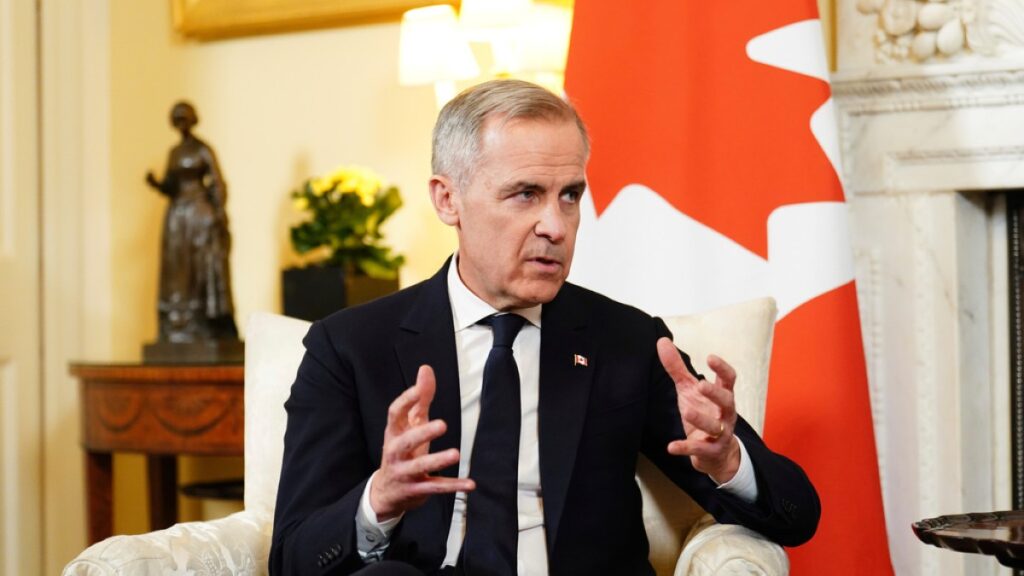
US president says he and the Canadian PM ‘agree on many things’ and will meet after Canada’s elections next month. President Donald Trump says he has had an “extremely productive call” with Canadian Prime Minister Mark Carney amid a spike in tensions and an escalating trade war between the United States and its northern neighbour. In a social media post describing the call on Friday, the US president sounded conciliatory towards Canada. Notably, Trump referred to the Canadian leader by his correct title as prime minister after months of calling Carney’s predecessor Justin Trudeau “governor”. “I just finished speaking with Prime Minister Mark Carney, of Canada,” Trump wrote. “It was an extremely productive call, we agree on many things, and will be meeting immediately after Canada’s upcoming Election to work on elements of Politics, Business, and all other factors, that will end up being great for both the United States of America and Canada.” While the statement lacked specifics, it marked a change in tone from Trump’s threats and hostile rhetoric towards Canada, which included repeated calls for the US to annex the country and make it its 51st state. Advertisement Friday’s talks were the first between the two leaders since Carney succeeded Trudeau two weeks ago. The call came less than 24 hours after Carney forcefully rebuked Trump for increasing tariffs on Canadian goods. The US president had announced 25-percent levies on foreign cars, starting on Wednesday. “I reject any attempts to weaken Canada, to wear us down, to break us, so that America can own us. That will never happen,” Carney said on Thursday. He also suggested that US-Canada ties have undergone a dramatic transformation because of Trump. “The old relationship we had with the United States – based on deepening integration of our economies and tight security and military cooperation – is over,” the Canadian prime minister told reporters. Still, Carney said he was looking forward to speaking to Trump to resolve the issues between the two countries. The Canadian prime minister has visited the United Kingdom and France after taking office. He has not yet gone to the US – traditionally Ottawa’s closest ally and trade partner. On Thursday, he stressed the need for Canada to “pivot” its trade relationships away from the US. Earlier this week, Trump warned Ottawa and the European Union against teaming up against Washington, threatening “far larger” tariffs against both. Canada is to hold a general election on April 28. Carney’s Liberal Party has surged in the polls over the past few weeks in part because of the change in its leadership after Trudeau’s resignation as well as the standoff with the US. Advertisement Adblock test (Why?)
Is South Sudan heading to another civil war?
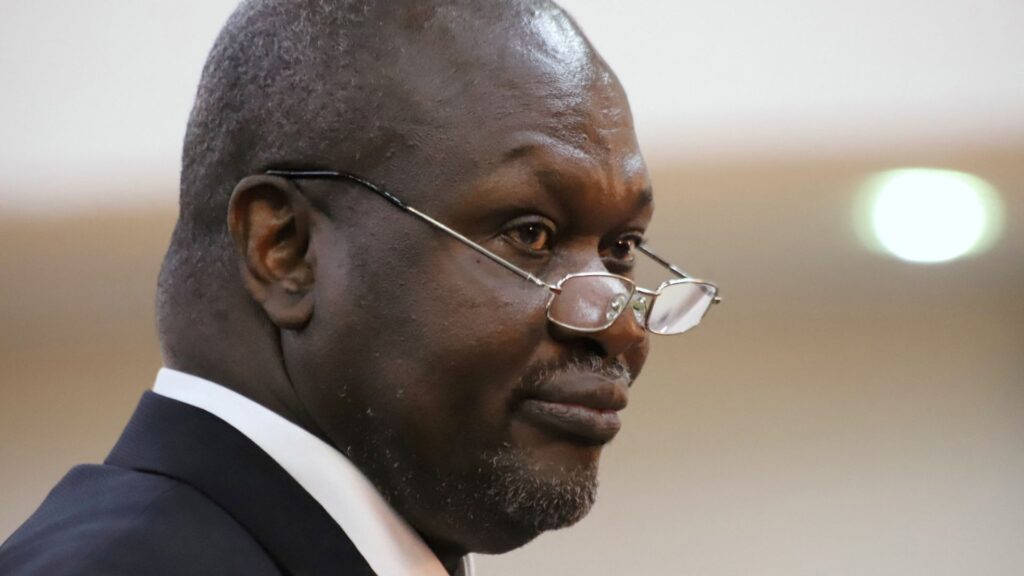
South Sudan is on the brink of another civil war, the United Nations has warned, after weeks of escalating violence and rising tensions between Vice President Riek Machar and President Salva Kiir. After Machar was placed under house arrest this week, his party said the 2018 peace deal that ended years of fighting had collapsed. Can the rival parties overcome political mistrust? Presenter: Cyril Vanier Guests: Patrick Oyet – journalist in South Sudan Daniel Akech – senior analyst for South Sudan at the International Crisis Group Abdullahi Halakhe – Horn of Africa security analyst and a senior advocate at Refugees International Adblock test (Why?)
Brazil fire coach Dorival after Argentina hammering in World Cup qualifier

Dorival was only appointed 14 months ago, but a 4-1 defeat against rivals Argentina proved to be his last game. Brazil coach Dorival Junior has been fired after 14 months in charge amid poor results and disappointing performances from the national team. Hiss sacking by Brazilian Football Confederation president Ednaldo Rodrigues came three days after a 4-1 defeat to bitter rival Argentina in Buenos Aires, Brazil’s heaviest defeat in a World Cup qualifier. Junior’s replacement has yet to be picked. Brazil are fifth in South America qualifying for the 2026 World Cup. The top six qualify automatically. Brazil’s Matheus Cunha looks dejected after the match in Argentina, which was Dorival’s last in charge [Rodrigo Valle/Reuters] Under the 62-year-old, Brazil won seven matches, drew another seven, and lost two. The team scored 25 goals and conceded 17. In the Copa America last year, Brazil was eliminated in the quarterfinals by Uruguay on penalties. Rodrigues was just re-elected on Monday to head the confederation to 2030. In 2023, he bet on Real Madrid coach Carlo Ancelotti to take over one year later. Advertisement While waiting for Ancelotti, Brazil retained Fernando Diniz as its coach. Diniz was fired in January 2024 after six matches on the job after Ancelotti extended his contract in Spain. Adblock test (Why?)
Real Madrid vs Leganes – LaLiga: Team news, kickoff, how to follow, stream

A turbulent week off the field sees Real Madrid return to LaLiga action against Leganes after the international break. Who: Real Madrid vs LeganesWhat: Spanish LaLigaWhere: Santiago Bernabeu, Madrid, SpainWhen: Saturday at 9pm (20:00 GMT) Follow Al Jazeera Sport‘s live text and photo commentary stream. Holders champions Real Madrid have endured a mixed season in the defence of their LaLiga and Champions League double. Barcelona moved three points clear at the top of the Spanish league following their 3-0 win against Osasuna on Thursday. Earlier this season, Real failed to reach the knockout stages of the Champions League automatically and were forced to qualify through the playoffs. Al Jazeera takes a look at their latest league fixture on the back of a turbulent week off the field for the Spanish giants. What charges were levelled against Real players this week? European football’s governing body opened an investigation on Thursday into a possible breach of disciplinary regulations by several Real players following the recent Champions League win over Atletico Madrid. The inquiry is focused on allegations of improper conduct involving Antonio Ruediger, Kylian Mbappe, Dani Ceballos and Vinicius Jr. A potential decision could impact Real’s Champions League quarterfinal legs against Arsenal on April 8 and 16, with Spanish media reports saying bans could be handed out. Advertisement UEFA did not detail the incidents under review, but Spanish media said Atletico filed a complaint over Real’s players taunting their fans with gestures and dances after the match, leading to objects being thrown at them. What was Real Madrid’s response to the charges? Real Madrid manager Carlo Ancelotti expressed confidence on Friday that UEFA’s investigation into alleged player misconduct will be resolved positively as members of his team face the prospect of missing upcoming key games. “We believe everything was correct and we hope UEFA makes a decision, but we trust that everything will end well,” Ancelotti told reporters. “We are confident in UEFA’s verdict as the players had just celebrated, that’s it, we wait for the verdict, but our players didn’t do anything wrong,” Ancelotti added. The Italian said his side would give everything to retain their LaLiga title, despite trailing leaders Barcelona in the standings by three points. Both sides are still in the Champions League and Copa del Rey. “Barcelona has an advantage, but we are going to fight until the end. I hope we have 17 matches [in all competitions] left until the end,” Ancelotti said. 🎯 Sharpshooters. pic.twitter.com/FgxDGSLPXd — LALIGA English (@LaLigaEN) March 28, 2025 How is the LaLiga title race shaping up? Barcelona’s win on Thursday was also their game in hand on their title rivals, and the three-point lead they have now gained is also bolstered by a goal difference that is 19 efforts superior to Real’s. Advertisement Atletico Madrid are also in action on Saturday as they travel to Espanyol earlier in the day. Real’s cross-city rivals start the day four points off second spot and seven off leaders Barcelona. Where are Leganes in LaLiga? Leganes start the latest round of matches in 18th place – the third relegation spot in Spain’s top flight. They have only recorded six wins in their 28 matches so far this season – losing 13. What are the charges relating to Ancelotti? Ancelotti is to stand trial on tax evasion charges in Spain on Wednesday. Spanish state prosecutors have accused the highly successful Italian coach of defrauding the state of $1m in 2014 and 2015. A Madrid-based court set the trial date on Friday. State prosecutors are seeking a prison sentence of up to four years and nine months on two counts of tax fraud. They accused Ancelotti in March 2024 of having used shell companies to hide his true earnings. Ancelotti has denied any wrongdoing. Real Madrid team news Real will be without goalkeeper Thibaut Courtois for Saturday’s league match at home against Leganes due to a muscle strain. Ancelotti was hopeful of other players returning in time for the Arsenal clash. “Courtois has a small issue, and we are trying to recover Ceballos and [Ferland] Mendy for the first leg against Arsenal,” Ancelotti said. Leganes team news Yvan Noupa faces a late fitness test after being withdrawn due to injury in Leganes’ final LaLiga game before the international break – a 3-2 defeat by Real Betis Advertisement Striker Daniel Raba was also taken off in that game but is expected to be fit. Former Real youth-team player Javi Hernandez is set to start at left-back in the absence of both Enric Franquesa and Borna Barisic Adblock test (Why?)
‘Denmark hasn’t done a good job’ says US VP during Greenland trip
[unable to retrieve full-text content] US Vice President JD Vance addressed US troops after he landed in Greenland, accusing Denmark for not doing a ‘good job’
Ukraine’s Zelenskyy cautious on new US minerals deal proposal
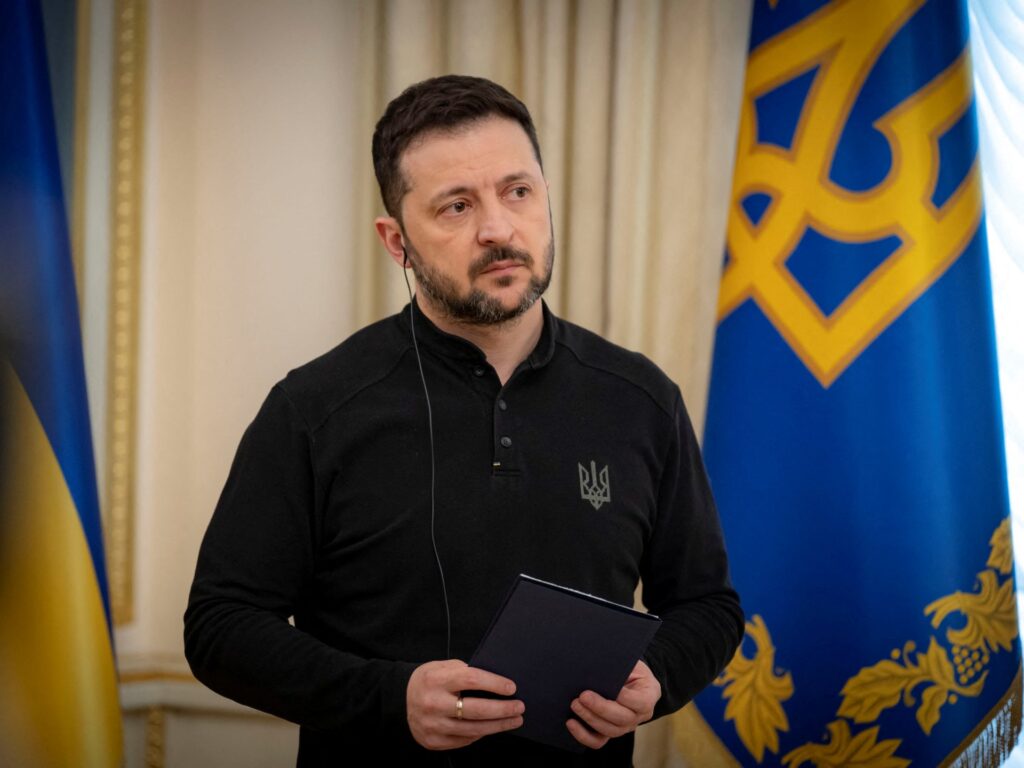
Kyiv to assess US proposal on minerals deal, noting major differences from earlier framework shared in bilateral talks. President Volodymyr Zelenskyy says that a new proposal that would give the United States access to Ukraine’s critical minerals differs significantly from the previous draft proposed by Washington, the Interfax-Ukraine news agency reported. Addressing a press briefing on Friday, Zelenskyy emphasised that the proposal, which was formally submitted to his office, will be compared with earlier plans shared with Deputy Prime Minister Yuliia Svyrydenko in bilateral talks with US officials. “The framework has been changed. Let us study this framework, and then we can talk,” he told a news conference in Kyiv. The Ukrainian president also said Kyiv would not recognise previously approved US military aid to his country as loans that need repaying. “We are grateful for the support, but this is not a credit, and we will not allow it to be treated as such,” he said, without mentioning whether such a demand featured in the latest version of the US proposal. Navigating an acceptable path forward on the issue is a major challenge for Zelenskyy after a rift with Trump last month saw Washington cut off flows of previously agreed military assistance and stop intelligence sharing. Advertisement It is also a highly sensitive diplomatic juncture with Trump trying to rapidly end the fighting with Russia, while reorienting Washington’s policy towards endorsing Moscow’s narrative about its three-year-old war in Ukraine. Regarding possible negotiations with Moscow, Zelenskyy said Ukraine could consider dialogue with Russian representatives who offer a real plan to end the war – but ruled out any talks with President Vladimir Putin. The comments come after the Russian president proposed to temporarily put Ukraine under external governance as part of efforts to reach a peaceful settlement. He also reaffirmed his claim that Zelenskyy, whose term expired last year, lacks the legitimacy to sign a peace deal. Under Ukraine’s constitution, it is illegal for the country to hold national elections while it’s under martial law. Putin claimed that any agreement that is signed with the current Ukrainian government could be challenged by its successors and said new elections could be held under external governance. “Under the auspices of the United Nations, with the United States, even with European countries, and, of course, with our partners and friends, we could discuss the possibility of the introduction of temporary governance in Ukraine,” Putin said. He added that it would allow the country to “hold democratic elections, to bring to power a viable government that enjoys the trust of the people, and then begin negotiations with them on a peace treaty.” He said such external governance is just “one of the options,” without elaborating. Advertisement UN Secretary-General Antonio Guterres dismissed such a proposal: “Ukraine has a legitimate government, and so obviously that must be respected.” Adblock test (Why?)
Trump administration seeks Congress approval for USAID reorganisation
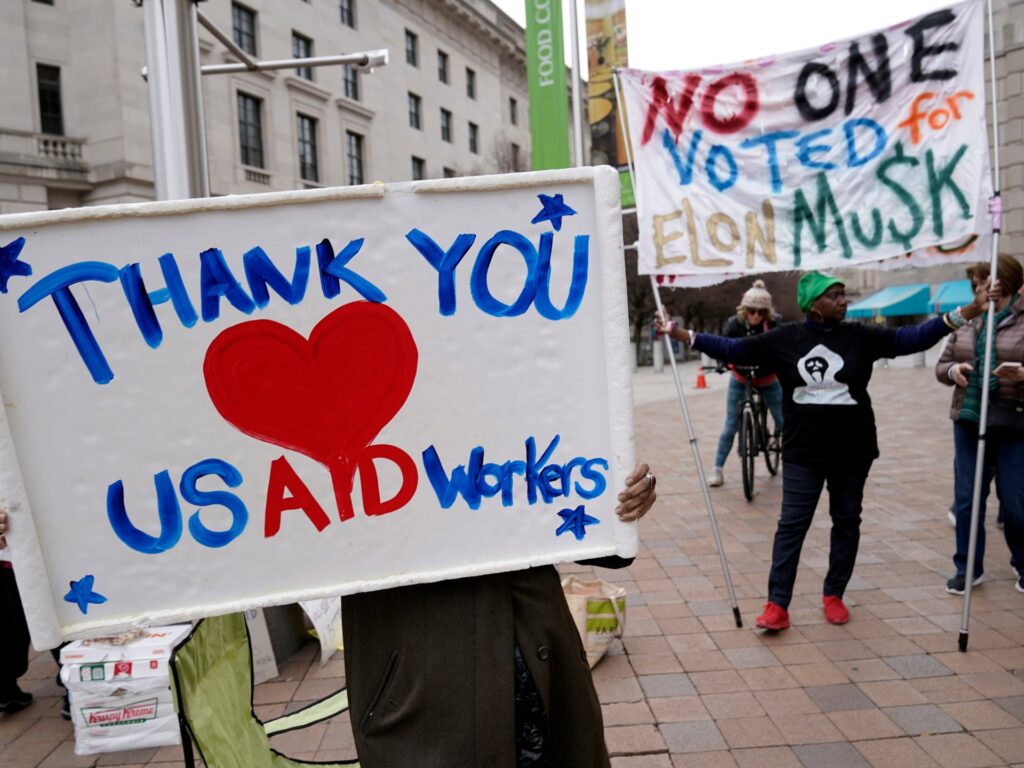
The administration of President Donald Trump has made a formal request to Congress to reorganise the United States Agency for International Development (USAID), as the Republican leader faces constitutional challenges over his dismantling of the agency so far. USAID was set up under an act of Congress. But on Friday, Secretary of State Marco Rubio issued a notification signalling that the Trump administration would fold the agency’s independent functions into the Department of State under executive control. “We are reorienting our foreign assistance programs to align directly with what is best for the United States and our citizens,” Rubio said in a statement on social media. “We are continuing essential lifesaving programs and making strategic investments that strengthen our partners and our own country.” But critics have accused the Trump administration of exceeding its executive authority — and seeking to undermine independent agencies that do not align with its priorities. State Department spokesperson Tammy Bruce addressed the matter at a news briefing later in the day. Advertisement She said department officials “have notified Congress on their intent to undertake a reorganisation that would involve realigning certain USAID functions to the department by July 1, 2025, and discontinuing the remaining USAID functions that do not align with administrative priorities”. Bruce also denied that the dismantling of USAID would affect the country’s ability to respond to international disasters like Friday’s earthquakes in Myanmar and Thailand. “ We are ready to move now. So there has been no impact on our ability to perform those duties, those requests for aid if and when they come in,” she said. USAID was established under Congress’s authority through the Foreign Assistance Act of 1961. But it does operate under the secretary of state. Until the start of Trump’s second term as president, the agency was one of the largest distributors of foreign aid in the world — but that activity largely stopped when the president implemented a freeze on foreign assistance. In 2023 alone, the US distributed approximately $72bn in foreign aid. USAID was responsible for distributing about half of that sum. But Rubio has since announced on social media that 83 percent of USAID’s contracts have been cancelled. Further employee cuts at USAID The agency has also suffered massive layoffs, a trend that continued on Friday. US media obtained an internal memorandum to USAID employees warning that all positions — save those required by law — would be eliminated. Bruce, the State Department spokesperson, asked about the scope of those changes during her briefing. Advertisement “With any major change, there’s going to be disruption,” she said, adding that the layoffs were not unexpected. “We’ve been waiting for this conclusion. It has arrived. I can’t speak to the number of people who will not be a foreign service officer at this point. I can’t say if it’s going to be every single one.” “ It’s a restructuring essentially,” she continued. “Like any restructuring, there will inevitably be disruptions from Secretary Rubio down. We are committed to ensuring that USAID personnel remain safe and that the agency’s ongoing lifesaving aid programmes remain both intact and operational.” Bruce tied the layoffs to the Trump administration’s campaign to eliminate alleged “waste and fraud and abuse”, a project led by adviser and billionaire businessman Elon Musk. Already, in February, USAID saw large-scale cuts to its workforce. About 1,600 people were laid off, and all but a handful of the remaining staff were placed on leave, including those stationed abroad. Its headquarters in Washington, DC, was also shuttered, and workers were given 15-minute time slots to enter the building and quickly collect their belongings. Earlier this month, a federal judge issued a ruling that Musk and his Department of Government Efficiency (DOGE) “likely violated the United States Constitution in multiple ways” by dismantling USAID. Judge Theodore Chuang wrote that Musk and DOGE “deprived the public’s elected representatives in Congress of their constitutional authority to decide whether, when and how to close down an agency created by Congress”. Advertisement Through a temporary injunction, Chuang ordered DOGE and Musk to stop their efforts to cut USAID’s staff and contracts. But it is not clear whether that order applies to actions taken by the secretary of state. Musk has previously boasted that he was involved in “feeding USAID into the wood chipper”. Adblock test (Why?)
